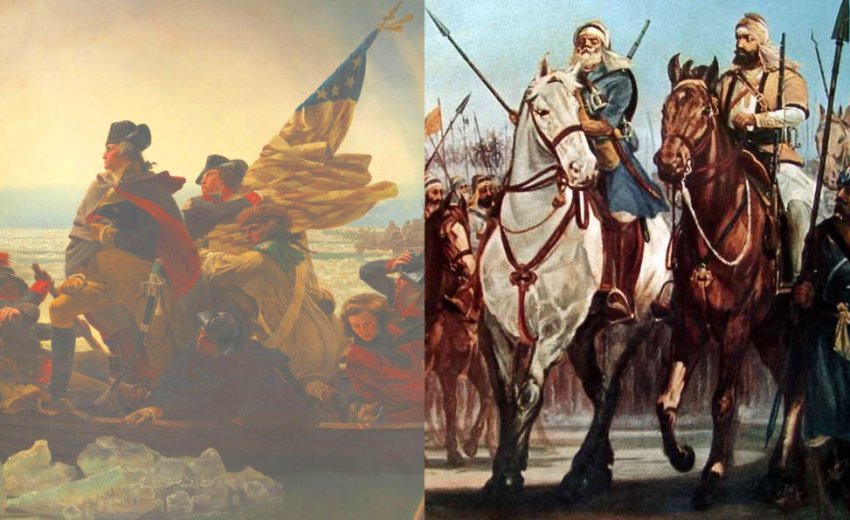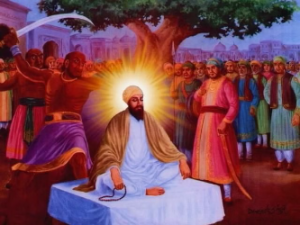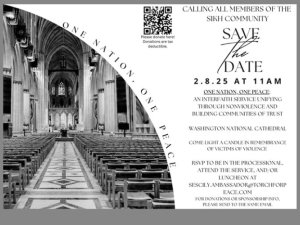We, too, are American! The United States celebrates Independence Day. To honor the 4th of July, SikhNet and the National Sikh Campaign would like to share some simple tools for Sikh American to help educate their fellow citizens about the Sikh identity.
Hate crimes have increased 300% towards Sikhs in the last year alone. We all need to be alert and more importantly to show America who we are. Read below to find the best way to change someone from saying, “I think Sikh is a type of bird” to saying, “I’m impressed and want to have Sikh friends in my neighborhood.”
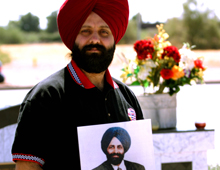 After 9-11, Sikh men with turbans and beards became targets of hate crimes in the United States. Yet, during that period, most US citizens expressed outrage in the face of those hate crimes. Balbir Singh Sodhi, a gas station owner from Phoenix, Arizona, was the first backlash murder victim in a drive-by shooting in the days following the September 11th attacks on the Twin Towers in New York City. Yet, the Phoenix community came together in an amazing display of tolerance and solidarity, supporting Balbir Singh’s family and the Sikh community. Balbir Singh’s gas station turned into an overnight altar, with candles and drawings, from people decrying the hate crime as un-American.
After 9-11, Sikh men with turbans and beards became targets of hate crimes in the United States. Yet, during that period, most US citizens expressed outrage in the face of those hate crimes. Balbir Singh Sodhi, a gas station owner from Phoenix, Arizona, was the first backlash murder victim in a drive-by shooting in the days following the September 11th attacks on the Twin Towers in New York City. Yet, the Phoenix community came together in an amazing display of tolerance and solidarity, supporting Balbir Singh’s family and the Sikh community. Balbir Singh’s gas station turned into an overnight altar, with candles and drawings, from people decrying the hate crime as un-American.
15 years later, the “War on Terror” drags on, and the world has changed drastically. Fear of radical Islam has penetrated American society and the mistrust of the beard and turban has become part of our cultural landscape. While Balbir Singh Sodhi’s murder made national headlines, today hate crimes against Sikhs barely make it past the local news. That sense of outrage present in Phoenix in 2001 has all but disappeared.
In the current climate, every Sikh has an obligation to educate Americans about the Sikh faith - about who we are, and what the Sikh turban stands for. The best PR campaign for our community is person to person, face to face, feet on the ground.
But what is the most effective way to educate the average US citizen about the Sikh faith, in the shortest amount of time? What are our elevator speeches, as a community?
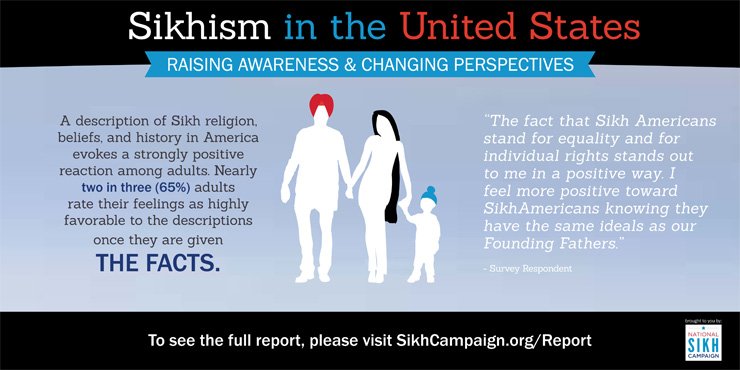
Thanks to the National Sikh Campaign and their partnership with Hart Research Associates, we have an answer to that question. In 2014, the National Sikh Campaign hired Hart Research to do focus groups with US citizens, identify the current attitudes towards Sikhs and determine what messages would help the average US citizen connect with and feel positive about the Sikh identity. The results of that research are in-depth and you can read the full reports here.
But the main take-away from the research is that US citizens respond best to those messages that connect the Sikh faith with core American values, and the American story.
It is important to see, from the research, that an estimated 60% of Americans admit to knowing nothing at all about Sikh Americans and only one in 10 Americans (11%) personally knows someone who is Sikh. So if each of us tries to educate just one person a day about the Sikh faith, it can do a lot of good.
How do you change the perception of the beard and turban as being potentially dangerous to something welcoming and positive? Here are a few of the key messages that proved most effective in changing the attitude of people in the focus group.
These messages did very well and were considered some of the most important messages in terms of educating the public about the Sikh identity.
-
Connect core Sikh Values with the American Revolution
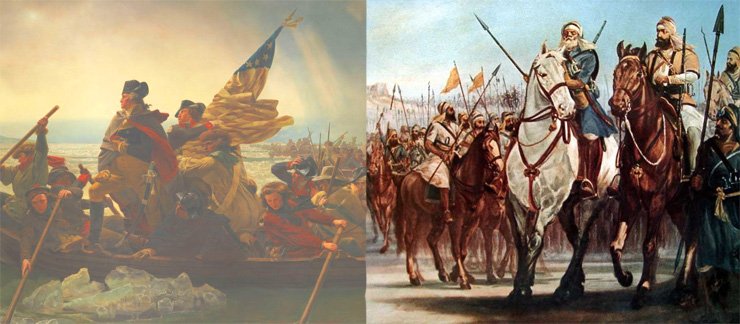
This first message connecting core Sikh values with the American Revolution was something that SikhNet used with very positive effect in the period following 9-11. And in the survey done, it was considered the most important message in terms of educating Americans about the Sikh identity.
If the American Revolution had started out as a spiritual movement instead of a political movement, it would look at lot like the Sikh religion. Just as the Founding Fathers of the United States put together a Bill of Rights that protected the fundamental rights for all US citizens, Sikhs also share a core set of beliefs that focus on the rights of all people to “life, liberty, and the pursuit of happiness.” Sikhs believe that all men and women are created equal and that the right to practice religion freely is encoded in Sikhs’ founding documents. For hundreds of years, Sikhs have fought, and many have given their lives, to protect the rights of others—including Hindus, Christians, and Muslims—to practice their own religions.
-
Sikhs Are Part of the American Dream
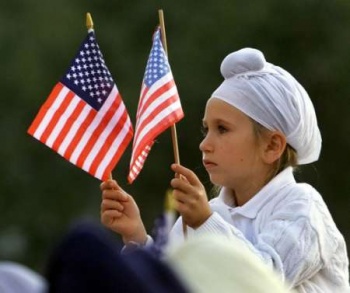
This next message relates to Sikhs as an immigrant community, taking part in the American dream.
Sikhs embody the quintessential American story. Like the Irish, Italians, and Chinese before them, Sikhs immigrated to this country seeking a chance to build a better life for their families through hard work. Today, Sikhs serve on their local PTAs and in Boy Scout troops, run small businesses and local charities, and sing our national anthem with pride. They are part of the fabric of their communities in every corner of this nation. They know that the United States is the greatest country on earth, and they are proud to call themselves Americans.
-
The Sikh Turban Represents American Values
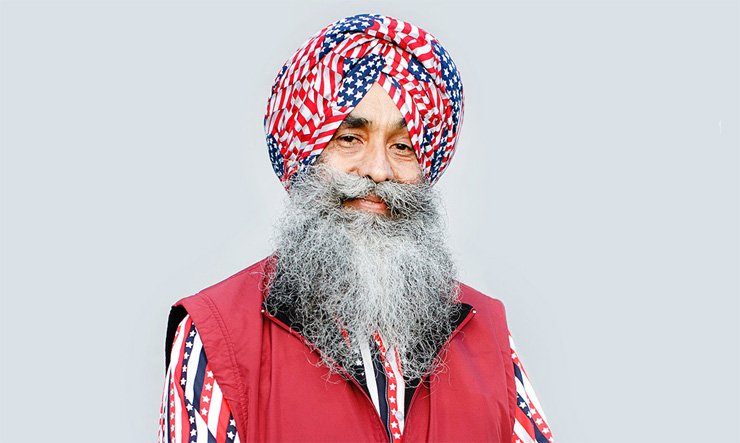
Other really important messages have to do with the Sikh turban, and how it represents values that Americans also hold dear.
Today, and for the last 500 years, many Sikhs around the world have worn the turban as an expression of their faith and their commitment to serve humanity. Throughout history, Sikhs have worn the turban to signal their readiness to protect all people against injustice, regardless of faith, gender, caste, or color. Today, a Sikh American who wears a turban signals that he or she is always ready to put him- or herself forward to serve the community’s needs. It represents their commitment to the equality, unity, and service that are at the heart of the American ethic.
-
Sikhs in the Military
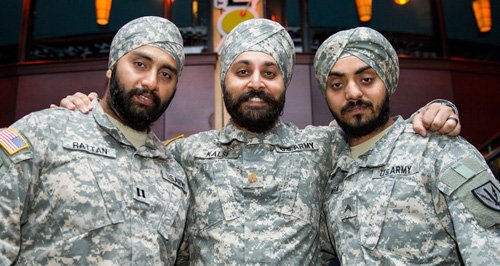
And of course, Sikhs’ role in the military is important to mention.
Sikhs have a long history of serving in the US armed forces with honor.
Throughout all of the messaging, the most important value for the focus group, by far, was the Sikh value of equality. Americans deeply appreciate equality as a national core value. By learning that the Sikh tradition also emphasizes equality, it creates a camaraderie with their American neighbors.
All of these messages really helped educate the focus groups about who Sikhs are, and created positive feelings towards the Sikhs because of it. Even with people who had never heard of a Sikh before they took part in the focus group.
According to the report, “After reading about Sikh history and beliefs as well as a series of messages about Sikhs, warm feelings toward Sikh Americans increase substantially. By the end of the survey, a large portion of Americans moved from feeling neutral (mean = 54.1 on a 0-100 scale) to warm (mean = 71.6, an increase
of 17.5 points). This movement toward warmth and positivity spans a wide swath of Americans including more challenging audiences such as Americans who did not attend college and Republicans.”
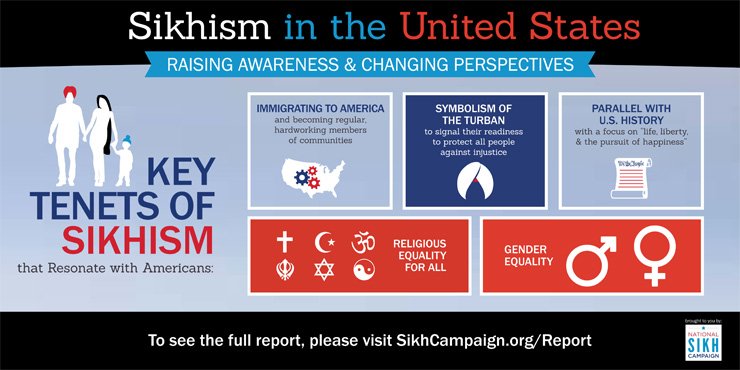
Right now, the world is in the midst of tremendous tension and turmoil. It has been almost an entire generation since 9-11, and it may be another generation or more before we find peace, with the rise of ISIS and the radicalization of Islam. The mistaken identity issues of Sikh men in beards and turbans will remain a pressing issue in the Sikh American community.
However, thanks to the National Sikh Campaign and Hart Research Associates, each of us now have a handful of really good elevator speeches that we can use to educate our friends, co-workers, neighbors, even people we speak to waiting in line at the grocery store about the Sikh faith. These very simple messages can turn each of us into a PR person for our entire community, educating Americans and creating a positive view of the turban and beard.
“I think that their core values and beliefs are wonderful. I would be proud to call them family, friend, neighbor . . . I think that they are misunderstood, and it saddens me that people including myself were unaware of their amazing values and core beliefs. I had no idea what a Sikh was until now.” - Survey respondent
